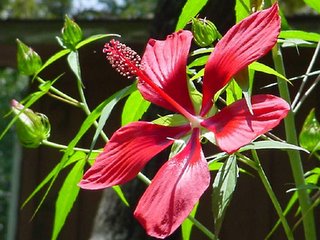 After a few years growing my own garden in North Dallas, I've learned a few things about what works and what doesn't with our climate. While our winters get just cold enough to freeze out tropicals, our summers are hot enough to kill just about everything else. Here are a few tips about what's worked for me as well as few hints about some surprising failures.
After a few years growing my own garden in North Dallas, I've learned a few things about what works and what doesn't with our climate. While our winters get just cold enough to freeze out tropicals, our summers are hot enough to kill just about everything else. Here are a few tips about what's worked for me as well as few hints about some surprising failures.Let's start with the good stuff
Veggie Garden Stars:
Early Girl Tomatoes: I've planted Early Girl's the last few years with great success. I've planted them on the North side of the house where they get morning and early afternoon sun and late afternoon shade. The plants produce from May to late June or mid July before it gets too hot for new buds to set on. If the summer is mild, plants may survive through and produce fruit in the fall as well. Be sure to cover with bird netting as both birds and squirrels will pick your plants clean.
Tomatillos: This is my 3rd year planting tomatillos. These plants produce like crazy in all but the hottest part of the summer. Bugs and animals steer clear of the fruit, so you'll have them all to yourself.
Bell Peppers: I've grown both green and purple varieties with success. This is my first year with these plants. They seem to slow bud and pepper production in the heat of the summer, but I got a good crop of peppers in June and July.
Basil: I've been growing basil from seed for about 5 years, both in pots and in the ground. I start my seeds inside around February and transplant outside in April. You can also seed directly into a pot or outdoor bed in late March. The leaves are best in the cooler months, but you can harvest all summer. Be sure to pinch off blooms which begin appearing in late June.
Ornamental Favorites:
Texas Star Hibiscus (pictured above): This plant is a native I picked up at the Herd Museum plant sale. I haven't taken it through a winter yet, but it has been a great plant so far this summer and is listed as a perennial. It has a red, star-shaped bloom and is heat tolerant and has not required excessive water. The blooms only last one day, so keep your eyes peeled. The plant is doing well in morning sun and afternoon shade.
Moon Flower Vine: This is an annual vine I have been growing from seed for several years. The seeds are hard to start. I recommend chipping the seed shell with a knife and soaking the seeds overnight before planting. The seeds must be planted in full sun and the vine is an aggressive climber. Once you get a moon flower vine started, it will quickly engulf a fence with broad leaves and huge white flowers that open at dusk and close at dawn. Some varieties are highly fragrant.
Don't want to make this too long, so I'll post more in the coming days.
No comments:
Post a Comment